
Snowden Family Band
Encyclopedia
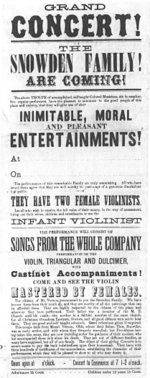
African American
African Americans are citizens or residents of the United States who have at least partial ancestry from any of the native populations of Sub-Saharan Africa and are the direct descendants of enslaved Africans within the boundaries of the present United States...
musical group. The children of the Snowden family of Clinton
Clinton Township, Knox County, Ohio
Clinton Township is one of the twenty-two townships of Knox County, Ohio, United States. The 2000 census found 3,326 people in the township.-Geography:Located in the west central part of the county, it borders the following townships:...
, Knox County
Knox County, Ohio
Knox County is a county located in the state of Ohio, United States. As of 2010, the population was 60,921. Its county seat is Mount Vernon and is named for Henry Knox, an officer in the American Revolutionary War who was later the first Secretary of War....
, Ohio
Ohio
Ohio is a Midwestern state in the United States. The 34th largest state by area in the U.S.,it is the 7th‑most populous with over 11.5 million residents, containing several major American cities and seven metropolitan areas with populations of 500,000 or more.The state's capital is Columbus...
, comprised the ensemble. The band's career stretched from before the American Civil War
American Civil War
The American Civil War was a civil war fought in the United States of America. In response to the election of Abraham Lincoln as President of the United States, 11 southern slave states declared their secession from the United States and formed the Confederate States of America ; the other 25...
into living memory
Contemporary history
Contemporary history describes the period timeframe that is without any intervening time closely connected to the present and is a certain perspective of modern history. The term "contemporary history" has been in use at least by the early 19th century. In the widest context of this use,...
; no other African American band of their type lasted as long.
The Snowdens made their living by farming. However, through their music, they integrated themselves into their predominantly white community and entertained, corresponded with, and even taught their white neighbors. A long Knox County tradition credits them with composing (or helping to compose) the famous song "Dixie
Dixie (song)
Countless lyrical variants of "Dixie" exist, but the version attributed to Dan Emmett and its variations are the most popular. Emmett's lyrics as they were originally intended reflect the mood of the United States in the late 1850s toward growing abolitionist sentiment. The song presented the point...
".
Performances
The Snowden children began touring sometime around 1850. Friends and contacts in other towns often invited them to perform, and their advertising consisted of nothing more than a few handbills and word of mouthWord of mouth
Word of mouth, or viva voce, is the passing of information from person to person by oral communication. Storytelling is the oldest form of word-of-mouth communication where one person tells others of something, whether a real event or something made up. Oral tradition is cultural material and...
. This invitation from Arthur Kirby is typical:
As we are going to have a Suinging party the 12th off August on Saturday The neighborhood requested me to drop you a few Line to inform you that They want you to come and give us a Concert on that Same evening. The Suinging part is in The grove is rite by the School House now i want you to be sure and come if you possibly can and if you can come Send me three or four bill if you have got them and i will put Them up for you
I am Shure off a Big crowd if you will Come if you can come Send me the Bills by next Saturday if you can if you have no bills Struck wright any how if you will come on that Evening and i will put The word out my Self and the rest of the boys.
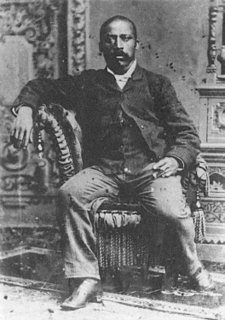
Concert
A concert is a live performance before an audience. The performance may be by a single musician, sometimes then called a recital, or by a musical ensemble, such as an orchestra, a choir, or a musical band...
tours lasted for several days and brought them to settlements across rural Ohio. They traveled in a vehicle that one contemporary described as a "sort of stage coach carriage", and they typically stopped in a village or town for a one-night engagement.
Sometimes, offers came to play in more lucrative markets farther afield. Friends wrote from Missouri
Missouri
Missouri is a US state located in the Midwestern United States, bordered by Iowa, Illinois, Kentucky, Tennessee, Arkansas, Oklahoma, Kansas and Nebraska. With a 2010 population of 5,988,927, Missouri is the 18th most populous state in the nation and the fifth most populous in the Midwest. It...
that "Ben if you and Lue would come Out here you could make A fortune holding concerts." Nevertheless, the band rarely strayed from within a 75 miles (120.7 km) radius of Clinton.
The band consisted of five regular members from among the seven Snowden children: Sophia, Ben, Phebe, Martha, Lew (or Lou), Elsie, and Annie. Their instruments were common for the mid-19th century, and most were store-bought. Sophia and Annie played fiddle
Fiddle
The term fiddle may refer to any bowed string musical instrument, most often the violin. It is also a colloquial term for the instrument used by players in all genres, including classical music...
, possibly the only females at the time known today to have done so. The band's handbills advertised this curiosity; one from the 1860s reads, "THEY HAVE TWO FEMALE VIOLINISTS . . . . COME AND SEE THE VIOLIN MASTERED BY FEMALES." The youngest child, Annie, was billed as "the infant violinist". Their fiddle-playing style was likely that used by slaves in the South. That is, they stressed rhythm and improvisation at the expense of melody and prewritten music. Their banjos likely played at a lower pitch than that used by white performers. Ben played fiddle and bones
Bones (instrument)
The bones are a musical instrument which, at the simplest, consists of a pair of animal bones, or pieces of wood or a similar material. Sections of large rib bones and lower leg bones are the most commonly used true bones, although wooden sticks shaped like the earlier true bones are now more...
, and Lew played banjo
Banjo
In the 1830s Sweeney became the first white man to play the banjo on stage. His version of the instrument replaced the gourd with a drum-like sound box and included four full-length strings alongside a short fifth-string. There is no proof, however, that Sweeney invented either innovation. This new...
; the Snowdens' banjos were fretless, and one was a six-stringer. Phebe danced. In addition, at least one of the Snowden children played guitar
Guitar
The guitar is a plucked string instrument, usually played with fingers or a pick. The guitar consists of a body with a rigid neck to which the strings, generally six in number, are attached. Guitars are traditionally constructed of various woods and strung with animal gut or, more recently, with...
and another the flute
Flute
The flute is a musical instrument of the woodwind family. Unlike woodwind instruments with reeds, a flute is an aerophone or reedless wind instrument that produces its sound from the flow of air across an opening...
. The dulcimer
Appalachian dulcimer
The Appalachian dulcimer is a fretted string instrument of the zither family, typically with three or four strings. It is native to the Appalachian region of the United States...
, tambourine
Tambourine
The tambourine or marine is a musical instrument of the percussion family consisting of a frame, often of wood or plastic, with pairs of small metal jingles, called "zils". Classically the term tambourine denotes an instrument with a drumhead, though some variants may not have a head at all....
, and triangle
Triangle (instrument)
The triangle is an idiophone type of musical instrument in the percussion family. It is a bar of metal, usually steel but sometimes other metals like beryllium copper, bent into a triangle shape. The instrument is usually held by a loop of some form of thread or wire at the top curve...
featured in their act on occasion, and the children also sang.
A Snowden concert began the instant the family came within earshot of a settlement. The children struck up a tune to gather attention as they headed to the concert site, usually a public location such as a schoolhouse, town hall, field, or graveyard. The price of admission was nominal, typically 25¢ for adults and 15¢ for children, and payment could be as informal as dropping something into a passed hat. An average engagement earned the band $11 to $12.
Audiences were primarily white, and the band performed in a manner that was pleasing to such tastes, yet which sustained their connection to their black culture and heritage. Their shows had no great spectacle aside from some animated dancing. They gathered their repertoire from sheet music, mail order, library songsters, and by playing with other musicians. The Snowdens could not read music, so they learned everything by ear
Learning music by ear
Learning music by ear is done by repeatedly listening to other musicians and then attempting to recreate what one hears. This is how people learn music in any musical tradition in which there is no complete musical notation...
. Most of these songs were popular tunes
American popular music
American popular music had a profound effect on music across the world. The country has seen the rise of popular styles that have had a significant influence on global culture, including ragtime, blues, jazz, swing, rock, R&B, doo wop, gospel, soul, funk, heavy metal, punk, disco, house, techno,...
drawn from minstrel show
Minstrel show
The minstrel show, or minstrelsy, was an American entertainment consisting of comic skits, variety acts, dancing, and music, performed by white people in blackface or, especially after the Civil War, black people in blackface....
s and circus
Circus
A circus is commonly a travelling company of performers that may include clowns, acrobats, trained animals, trapeze acts, musicians, hoopers, tightrope walkers, jugglers, unicyclists and other stunt-oriented artists...
acts, though the band avoided material that was overly demeaning of black culture or that was written in over-the-top, racist
Racism
Racism is the belief that inherent different traits in human racial groups justify discrimination. In the modern English language, the term "racism" is used predominantly as a pejorative epithet. It is applied especially to the practice or advocacy of racial discrimination of a pernicious nature...
black dialect. Nevertheless, they avoided overtly abolitionist
Abolitionism
Abolitionism is a movement to end slavery.In western Europe and the Americas abolitionism was a movement to end the slave trade and set slaves free. At the behest of Dominican priest Bartolomé de las Casas who was shocked at the treatment of natives in the New World, Spain enacted the first...
material. Some of their repertoire was from black composers; they sang both "Oh, Dem Golden Slippers" and "In the Morning by the Bright Light" by James A. Bland
James A. Bland
James Alan Bland , also known as Jimmy Bland, was an African American musician and song writer.-Biography:...
, for example. They were fairly up to date; the band sang "My Old Kentucky Home
My Old Kentucky Home
"My Old Kentucky Home" is a minstrel song by Stephen Foster , probably composed in 1852. It was published as "My Old Kentucky Home, Good Night" in January 1853 by Firth, Pond, & Co. of New York...
" within two years of its composition. Spirituals
Spiritual (music)
Spirituals are religious songs which were created by enslaved African people in America.-Terminology and origin:...
and hymn
Hymn
A hymn is a type of song, usually religious, specifically written for the purpose of praise, adoration or prayer, and typically addressed to a deity or deities, or to a prominent figure or personification...
s comprised another important aspect of their act. Improvisation
Improvisation
Improvisation is the practice of acting, singing, talking and reacting, of making and creating, in the moment and in response to the stimulus of one's immediate environment and inner feelings. This can result in the invention of new thought patterns, new practices, new structures or symbols, and/or...
was common.
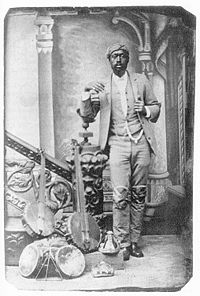
The citizens of Mt. Vernon, recommend to you the Snowden Family. We have known them from their youth up, and they are worthy of all the patronage that can be afforded them. They are highly respected by the citizens of this place and wherever they have performed. Their father was a member of the M. E. Church until his death -- the mother is a faithful member of the same church. . . . Good references given if required.
They also touted their wholesomeness. One handbill asked "Christians, Preachers, Lawyers, Doctors" to come see them play. Still, the dangers of travel were known even to the Snowdens' white acquaintances. E. D. Root wrote to Sophia Snowden:
We are all glad to hear from you and we are glad to hear you are all well and have got back home safe and well i hope you have done well by travelling on your account and situation i was wondering what had become of you all a few days a go and we did not know but you ware all dead.
Where they were well known, they often stayed with some distinguished resident for the night. The next morning, they moved on to the next settlement, usually about ten miles (16 km) away. Their itinerary always remained flexible, and tours had no set duration. One friend wrote: "i suppose you have got home buy this time . . . . we have all putt off writing to you so as to bee shure that you may bee at home we thought you may bee gone longer than you expected."
Songs by the Snowdens
Original compositions made up some portion of the Snowden band's repertoire, although they rarely wrote these down. As a result, "We Are Goin to Leave Knox County", written in the 1860s, is the only surviving song of undeniable Snowden origin. Its first versePoetry
Poetry is a form of literary art in which language is used for its aesthetic and evocative qualities in addition to, or in lieu of, its apparent meaning...
and refrain
Refrain
A refrain is the line or lines that are repeated in music or in verse; the "chorus" of a song...
bid the Snowden home farewell:
- We are goin to leave knox County
- To lands We Nevre Sean
- With nothing But our violins
- To make the music ring
- fare Well knox conty
- fare Well fore a Whyle
- fare well knox conty Dear
- an friends that on ous Smile
Still, a Mount Vernon, Ohio
Mount Vernon, Ohio
Mount Vernon is a city in Knox County, Ohio, United States. The population was 16,990 at the 2010 census. It is the county seat of Knox County. The city is named after Mount Vernon, the plantation owned by George Washington.-History:...
, tradition credits the Snowdens with at least one other well-known work: "Dixie
Dixie (song)
Countless lyrical variants of "Dixie" exist, but the version attributed to Dan Emmett and its variations are the most popular. Emmett's lyrics as they were originally intended reflect the mood of the United States in the late 1850s toward growing abolitionist sentiment. The song presented the point...
". The story, now in its third generation, dates to the 1910s or 1920s. It even prompted the local black American Legion
American Legion
The American Legion is a mutual-aid organization of veterans of the United States armed forces chartered by the United States Congress. It was founded to benefit those veterans who served during a wartime period as defined by Congress...
post to place a new grave marker on Ben and Lew Snowden's final resting site in 1976, reading, "They taught 'Dixie' to Dan Emmett." However, the notion is implausible. Ben and Lew Snowden were only small children when Dan Emmett
Dan Emmett
Daniel Decatur "Dan" Emmett was an American songwriter and entertainer, founder of the first troupe of the blackface minstrel tradition.-Biography:...
and Bryant's Minstrels
Bryant's Minstrels
Bryant's Minstrels was a blackface minstrel troupe that performed in the mid-19th century, primarily in New York City. The troupe was led by the O'Neill brothers from upstate New York, who took the stage name Bryant....
first performed the now-famous walkaround
Walkaround
A walkaround was a dance from the blackface minstrel shows of the 19th century. The walkaround began in the 1840s as a dance for one performer, but by the 1850s, many dancers or the entire troupe participated...
in New York City.
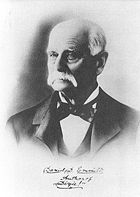
The Snowdens made little distinction between music they wrote and music they played, so the idea that they might have collaborated or even given a song to Dan Emmett is therefore not surprising. Evidence does place Emmett where he might have encountered, or even played with, the Snowdens: His grandparents' farm neighbored the Snowdens', his father may have shoed the Snowdens' horses, and his birthplace later became the Snowdens' church. An unpublished biography, written in 1935 by a friend of Emmett's family, places him in Mt. Vernon several times beginning in 1835 and into the 1860s. Furthermore, Ben and Lew Snowden had at least some connection to Emmett. On his death in 1923, one of Lew Snowden's boxes contained a newspaper clipping that named Emmett as composer of "Dixie" and a framed picture of Emmett with "Author of 'Dixie!'" written across it.
Nevertheless, this evidence is, in the end, merely circumstantial
Circumstantial evidence
Circumstantial evidence is evidence in which an inference is required to connect it to a conclusion of fact, like a fingerprint at the scene of a crime...
. Many scholars, such as E. Lawrence Abel, reject the whole notion of a Snowden connection to "Dixie".
Family life
Thomas Snowden, a freed slaveHistory of slavery in the United States
Slavery in the United States was a form of slave labor which existed as a legal institution in North America for more than a century before the founding of the United States in 1776, and continued mostly in the South until the passage of the Thirteenth Amendment to the United States Constitution in...
, and Ellen Cooper, a house servant, met and married in Knox County. They had nine children, of whom seven survived infancy. Although Thomas and Ellen Snowden were both illiterate, the children attended white schools and learned to read and write.
The Snowdens were primarily farmer
Farmer
A farmer is a person engaged in agriculture, who raises living organisms for food or raw materials, generally including livestock husbandry and growing crops, such as produce and grain...
s by trade, with their homestead located at Clinton, Ohio
Clinton, Ohio
Clinton is a village in Summit County, Ohio, United States. The population was 1,337 at the 2000 census. It is part of the Akron Metropolitan Statistical Area.- History :...
, a small village north of Mount Vernon. In July 1856, the 39-year-old Ellen Snowden became the head of household upon the death of Thomas Snowden, 53. The family soon had trouble paying the mortgage
Mortgage loan
A mortgage loan is a loan secured by real property through the use of a mortgage note which evidences the existence of the loan and the encumbrance of that realty through the granting of a mortgage which secures the loan...
on their farm, prompting them by 1859 to add a line to their handbills proclaiming that they were trying "to secure means to pay back indebtedness upon their homestead." In 1864, the bank foreclosed on two of their farm's 8 acres (32,374.9 m²). Ellen Snowden paid the rest of the mortgage the following year.
Their music allowed the Snowdens to integrate into their mostly white community. Music and the Snowdens were synonymous in the area; the 1860 census for Morris Township in Knox County lists their "Profession, Occupation, or Trade" as "Snowden Band", and an 1876 city directory
City directory
A city directory is a listing of residents, streets, businesses, organizations or institutions, giving their location in a city. Antedating telephone directories, they have been in use for centuries....
for Mount Vernon lists them as "Snowden Minstrels". The Snowdens played local events, or received invitations telling them, for example, that "Snowden & Mrs. Snowden Are Respectfully Invited to attend a Birthday Party At Mr. Samuel Alberts of their daughter on Monday Evening. Please bring your music." George Root, a white man, even asked to live with the family during the Civil War so that he could take singing and fiddling lessons.
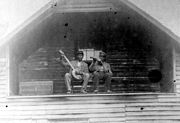
Despite their reputation, the Snowdens were not immune to prejudice
Prejudice
Prejudice is making a judgment or assumption about someone or something before having enough knowledge to be able to do so with guaranteed accuracy, or "judging a book by its cover"...
. In 1864, Ellen Snowden sued white neighbors who were preventing her from planting crops; she won the case. Days after the passing of the 15th Amendment
Fifteenth Amendment to the United States Constitution
The Fifteenth Amendment to the United States Constitution prohibits each government in the United States from denying a citizen the right to vote based on that citizen's "race, color, or previous condition of servitude"...
on 3 February 1870, a local official prevented Ben Snowden from voting. Snowden sued the man but ultimately lost the case. Beginning in 1878, Ben Snowden, aged 38, courted a 23-year-old white woman named Nan Simpson, who lived in Newville, Ohio, just north of Knox County. Their affair lasted two years before Ellen Snowden learned of it and put a stop to the relationship.
Socially the Snowdens professed conservative
Conservatism
Conservatism is a political and social philosophy that promotes the maintenance of traditional institutions and supports, at the most, minimal and gradual change in society. Some conservatives seek to preserve things as they are, emphasizing stability and continuity, while others oppose modernism...
values, praising in their letters and music such concepts as women's virtue, temperance
Temperance movement
A temperance movement is a social movement urging reduced use of alcoholic beverages. Temperance movements may criticize excessive alcohol use, promote complete abstinence , or pressure the government to enact anti-alcohol legislation or complete prohibition of alcohol.-Temperance movement by...
, and piety
Piety
In spiritual terminology, piety is a virtue that can mean religious devotion, spirituality, or a combination of both. A common element in most conceptions of piety is humility.- Etymology :...
. They attended the African Methodist Episcopal Church
African Methodist Episcopal Church
The African Methodist Episcopal Church, usually called the A.M.E. Church, is a predominantly African American Methodist denomination based in the United States. It was founded by the Rev. Richard Allen in Philadelphia, Pennsylvania, in 1816 from several black Methodist congregations in the...
, one of the few in the United States at the time that used instruments during the worship service. Less conservatively, they supported abolitionism, though never overtly.
By 1900, Ben and Lew Snowden were the last remaining members of the family. They took up racehorse driving as a hobby and continued to farm, but it was still their music that defined them. They performed from their home's gable, and the next generation of fiddlers most likely sought them out. Though there is no hard evidence to prove such meetings occurred, both John Balzell and Dan Emmett likely knew the Snowdens and played with them on occasion. Ben Snowden died in 1920, and Lew Snowden in 1923. They left no known heirs.

